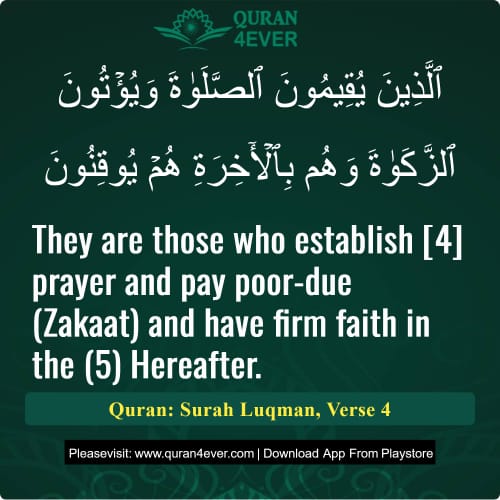
Transliteration:( Allazeena yuqeemoonas Salaata wa yu'toonaz Zakaata wa hum bil Aakhirati hum yooqinoon )
"They are those who establish [4] prayer and pay poor-due (Zakaat) and have firm faith in the (5) Hereafter."
This verse explains that only the one who possesses both faith and piety will derive the full benefit from the Holy Qur’an. It is not merely the act of reading, but the combination of belief, action, and reverence that unlocks its deeper wisdom.
It is further emphasized that the Holy Qur’an was not revealed as a guide for the Holy Prophet ﷺ himself, because he was already on perfect guidance before its revelation. Even prior to his official Prophethood, the Prophet ﷺ was a paragon of faith, complete in piety, and immersed in religious devotion. When the first verse of the Qur’an was revealed, he was already engaged in Salaah and I’tikaaf, demonstrating his intimate familiarity with worship and deep spiritual knowledge.
Salaah is superior to Zakaat, as it has been mentioned before Zakaat in this verse. This ordering indicates its greater rank and foundational role in Islamic practice.
The validity of Salaah and Zakaat is conditioned by faith. The presence of the conjunction "wa" (and) is interpreted to mean that these acts are acceptable only when performed in a state of belief.
Although Zakaat was made obligatory later in Madinah, this Makkan verse mentions it in advance. This reveals that preliminary knowledge and instructions were given by Allah beforehand, preparing the believers so that when the obligation arrived, they were already spiritually equipped to fulfill it.
The tafsir of Surah Luqman verse 4 by Ibn Kathir is unavailable here.
Please refer to Surah Luqman ayat 1 which provides the complete commentary from verse 1 through 7.
(31:4) who establish Prayer and pay Zakah, and have firm faith in the Hereafter.[3]
3. It does not mean that the righteous people bear only these three qualities. By using the common epithet of righteous for them, it has been pointed out that they refrain from all those evils which this Book forbids and practice all those good things which this Book enjoins. Then, the three qualities of the righteous person have been especially mentioned in order to show that all other good acts depend on these three things. They establish the Salat which engenders God worship and piety as a permanent habit with them. They pay the Zakat which strengthens the spirit of sacrifice in them, subdues the love of the world and arouses a desire for the goodwill of Allah. And they believe in the Hereafter, which instills the sense of responsibility and answerability. This does not allow them to live like an animal which is free to graze at will in the pasture, but allows a man who is fully conscious of the fact that he is not independent but the slave of a Master before Whom he is answerable for all his activities of life. Owing to these three qualities, these righteous people are not the kind of the righteous persons who happen to do good just by chance, who may commit evil as often and as freely as they would do good. Contrary to this, these qualities inculcate in them an enduring system of thought and morality owing to which goodness issues forth from them in a regulated and systematic manner, and the evil, if at all committed, is committed just by chance. They do not have any deeprooted motives, which might be arising from their own system of thought and morality and leading them on to the evil way under their own nature impulse.

For a faster and smoother experience,
install our mobile app now.
Related Ayat(Verses)/Topics